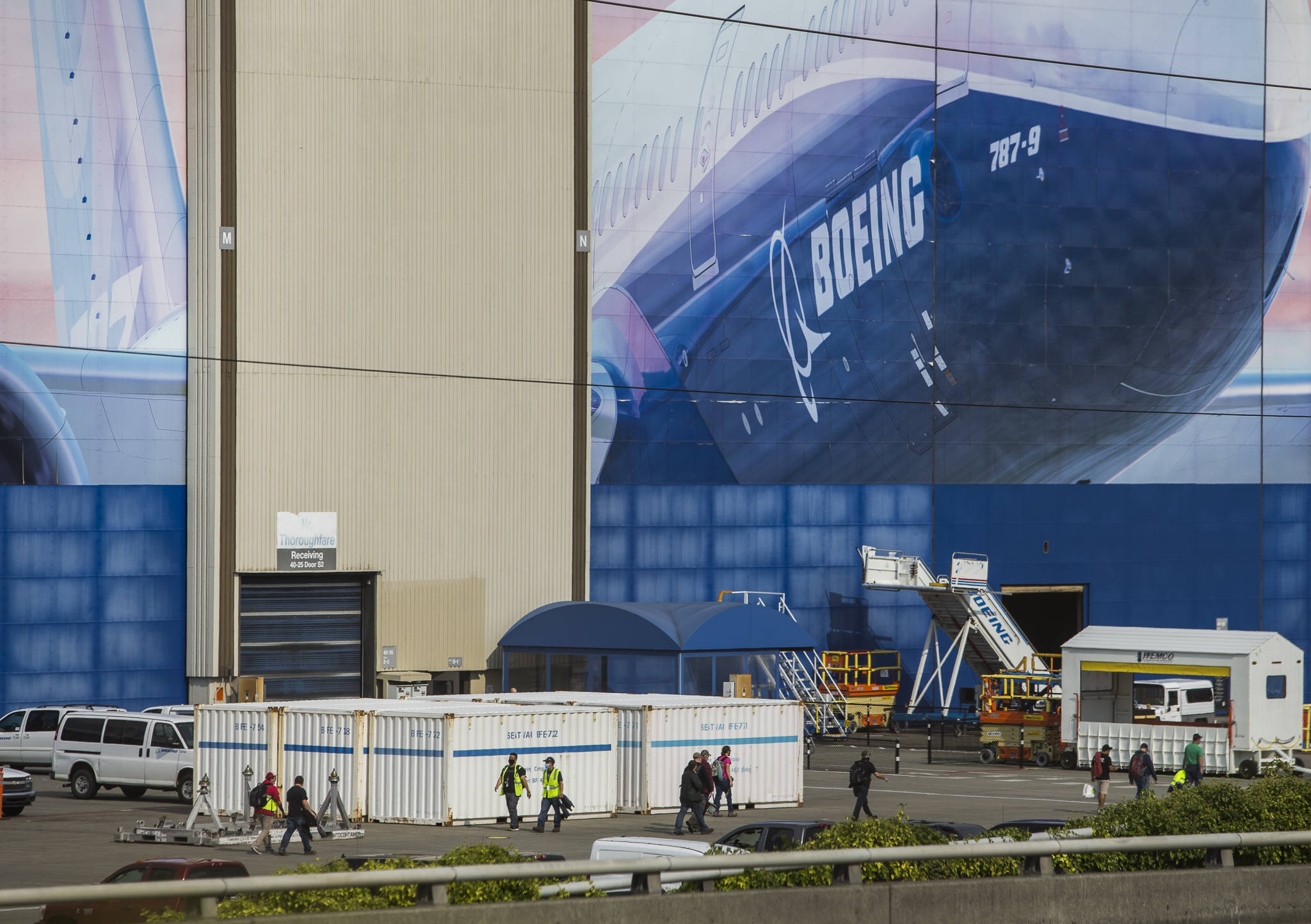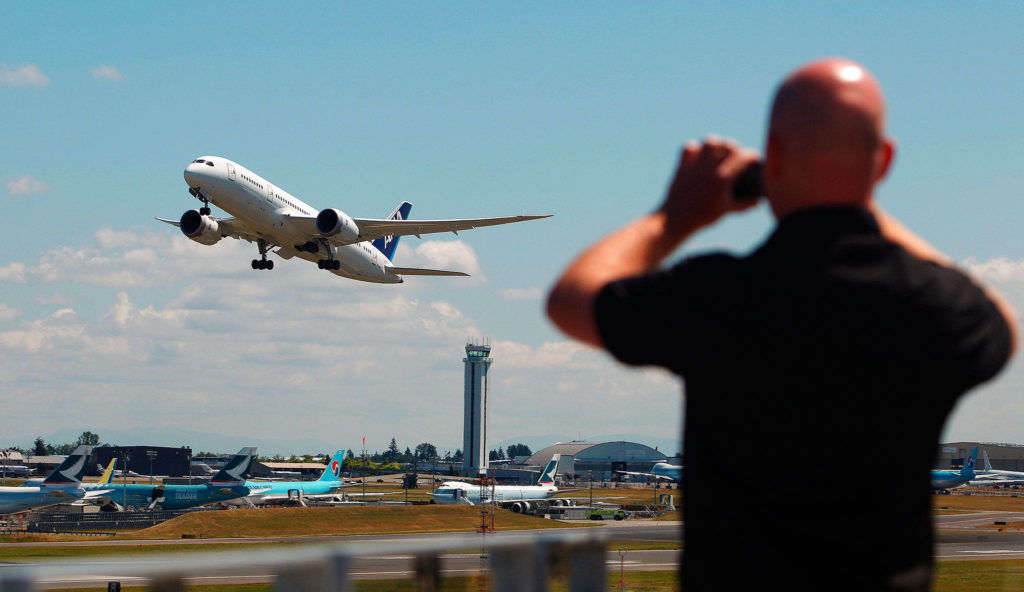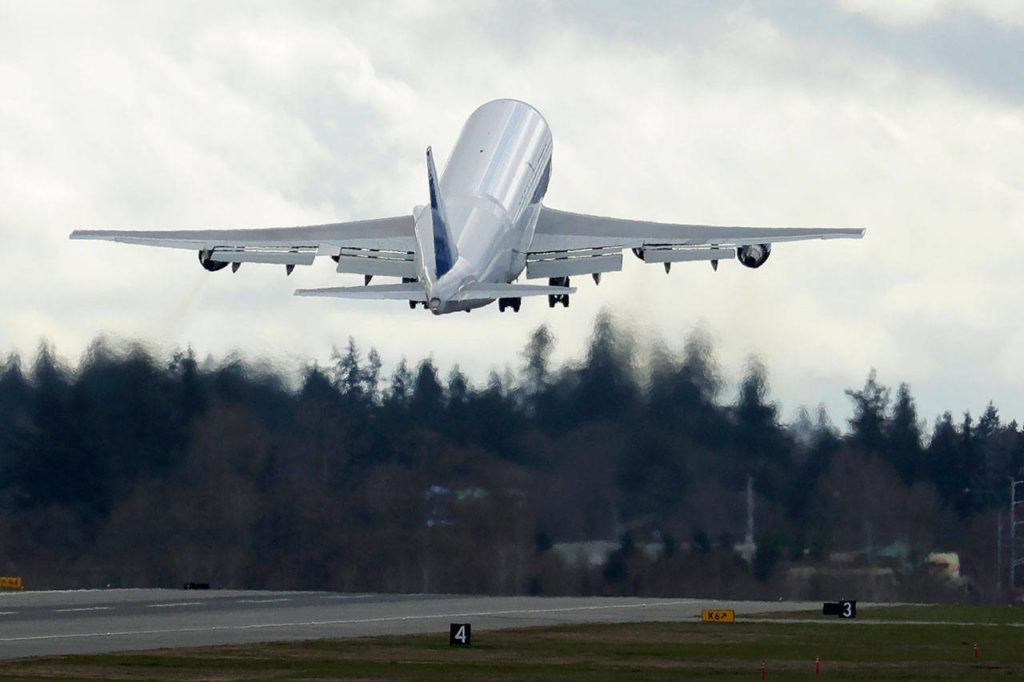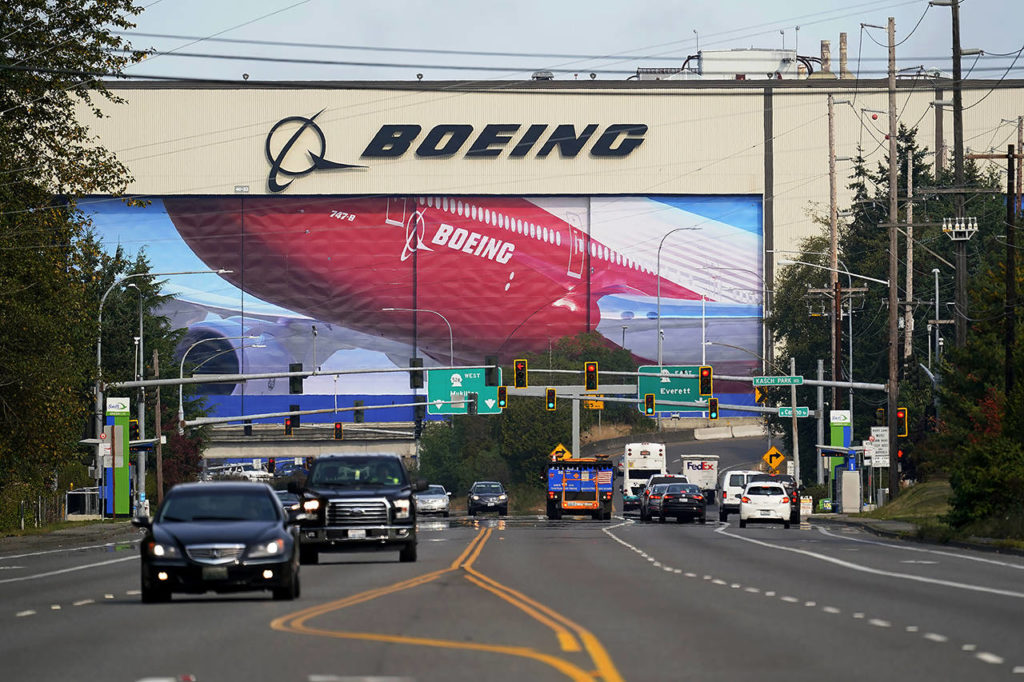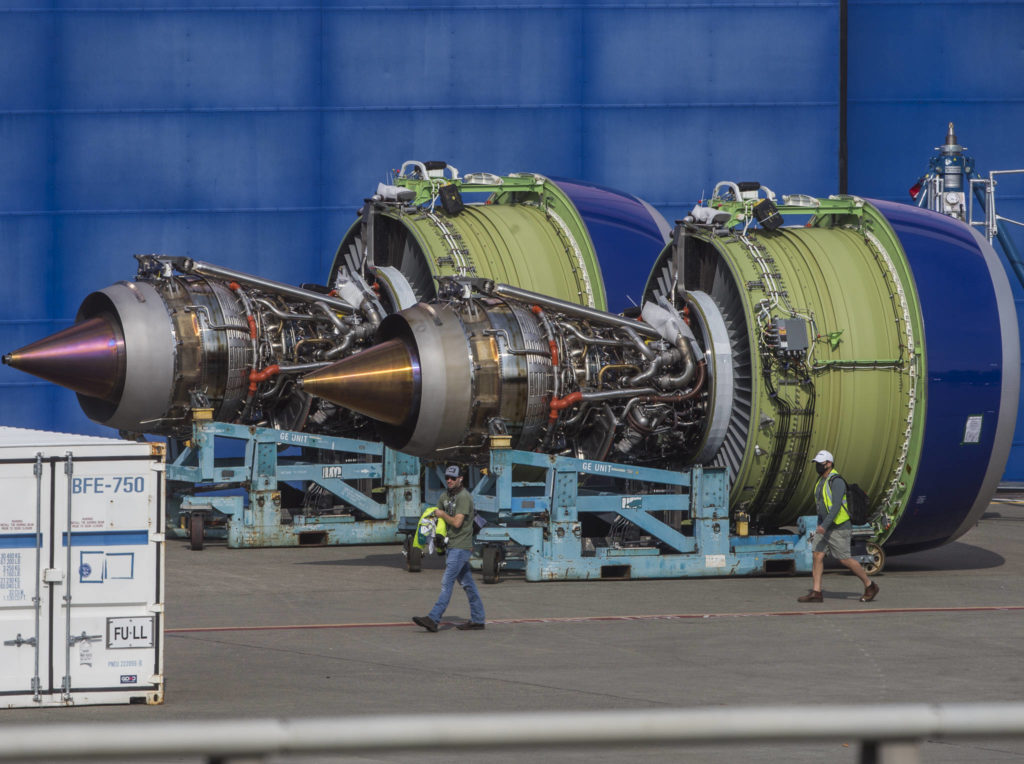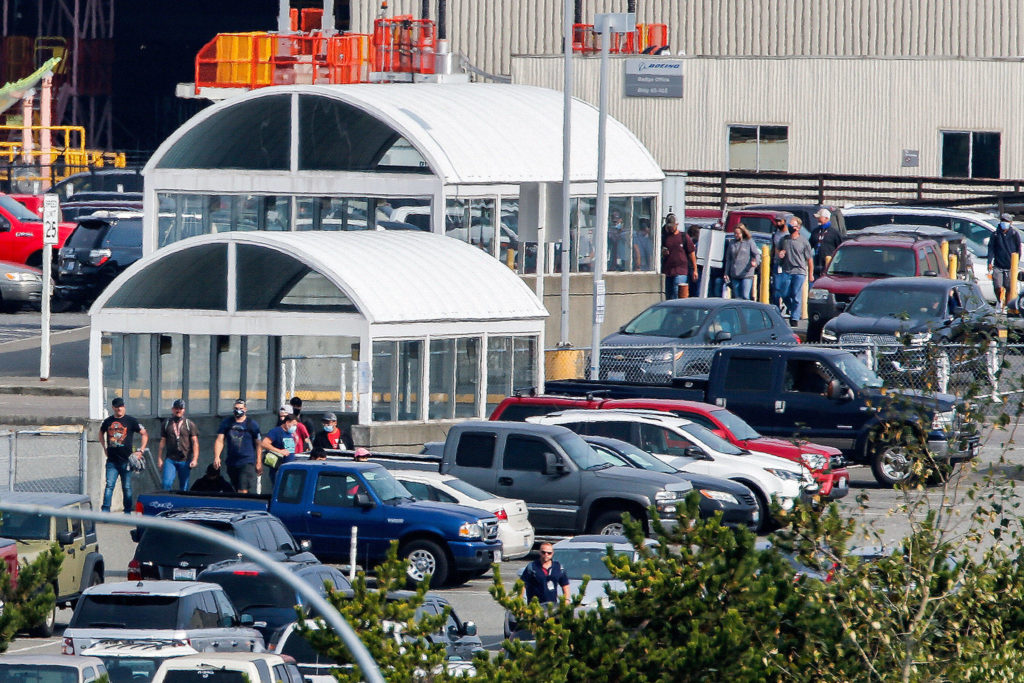EVERETT — In a staggering blow to the state and the region’s aerospace economy, the Boeing Co. confirmed it will move all production of the 787 Dreamliner to South Carolina by mid-2021 and close the plane’s assembly line in Everett.
Work on the 787 at the Everett plant will be phased out over the next nine months.
The Chicago-based company made the announcement Thursday morning. Reaction around the state was swift.
Union officials called it wrong-headed, another in a “string of bad decisions” by Boeing.
Gov. Jay Inslee, who described it as “an insult to the hardworking aerospace employees,” expressed his “profound disappointment” to company leaders.
“Boeing’s decision to take the 787 to South Carolina necessitates a review of our partnership and the company’s favorable tax treatment,” Inslee said, referring to $2.2 billion in tax savings Boeing has seen since launching the Dreamliner.
The most generous tax break, a rate reduction on the state’s business-and-occupation tax, was repealed this spring by state lawmakers at Boeing’s request. The rollback aimed to resolve a dispute with the World Trade Organization, which targeted the tax break as an illegal trade subsidy. However, it represents only half of the tax advantages Boeing still enjoys, Inslee noted at a news conference on Thursday.
Boeing characterized its decision as a cost-cutting measure and a response to the coronavirus pandemic, which has crushed the airline and travel industries. Demand for new passenger jets has evaporated since the pandemic escalated in March.
“The Boeing 787 is the tremendous success it is today thanks to our great teammates in Everett,” Stan Deal, president and chief executive officer of Boeing Commercial Airplanes, said in a statement.
“They helped give birth to an airplane that changed how airlines and passengers want to fly.
“As our customers manage through the unprecedented global pandemic, to ensure the long-term success of the 787 program, we are consolidating 787 production in South Carolina,” Deal said.
Boeing’s Everett plant will continue to build the 747, 767, KC-46 Pegasus and 777 series airplanes, he added.
State and local leaders called Boeing’s decision deeply disappointing and misguided. Others branded it a betrayal in light of the generous tax breaks, workforce training and investment in infrastructure that has benefited Boeing.
Inslee, at a press conference on Thursday, said Washington “has done everything it could do” to keep production in the state.
Despite repeated requests from the governor’s office, Boeing never offered suggestions on what the state could do to keep the Everett 787 line, Inslee said.
He was also disturbed by the scope of Boeing’s decision, which shut the door on restarting production in Everett when the economy returns.
“When the market comes back, so should these jobs,” Inslee said.
Jon Holden, president of the International Association of Machinists and Aerospace Workers District 751, said the decision badly discounts “the quality and productivity of the Puget Sound workforce.”
“Favoring a non-union site is only about control of the workforce, nothing more,” Holden said, referring to the South Carolina 787 assembly plant, which is not unionized.
“Boeing doesn’t respect that our members have the ability to stand up, voice concerns and attempt course correction of poor management decisions to protect the integrity of the airplanes and the industry,” Holden said. “This ability should be looked at as a positive; however, Boeing only sees it as conceding control rather than ensuring a quality product.”
Everett Mayor Cassie Franklin and Snohomish County Executive Dave Somers offered a more conciliatory response to the decision.
“This isn’t a betrayal,” Franklin said. “This is a company making a decision — a really difficult decision in unprecedented times.”
During a joint news conference, Franklin and Somers stressed the need to maintain a healthy relationship with the company and uphold Everett’s standing as an aerospace manufacturing capital, so that Paine Field remains an attractive production site for new models when the industry eventually recovers.
“We are an aerospace manufacturing community,” Somers said. “It’s in our history.”
Meanwhile, the city and county will work with Workforce Snohomish and other partners to train displaced workers to put their skills to use in other industries, until air travel is again in high demand.
Boeing spokeswoman Jessica Kowal told The Daily Herald there are no plans to alter the supplier network.
“We don’t intend to make any changes to our existing suppliers as a result of the decision to consolidate 787 work in South Carolina,” Kowal said. “Our sourcing decisions are based on a supplier’s ability to meet our performance, affordability and schedule requirements, among other needs.”
In Washington, Boeing’s supply chain consists of about 1,500 companies, including some 200 in Snohomish County.
In Mukilteo, Gina Morken, co-owner of New Tech Industries, a Boeing supplier, said the “decision to close the 787 line in Everett was very sad news to read.”
The aerospace company manufactures the tool that’s used to drill hinge holes for the 777X’s 11-foot folding wingtips and other aerospace components.
“We really don’t know how this will affect us,” Morken said. “We do work for South Carolina as well, so it’s possible nothing will change.”
At the Boeing campus in Everett, workers were outraged, “to say the least,” and distraught over the prospect of layoffs, said an Everett worker who asked not to be identified due to fears of being fired.
Many expect more than “just 1,000 may be laid off,” the worker added.
About 900 employees support 787 production in the Puget Sound region, including those working on the 787 final assembly line in Everett, the company said.
At one point, the worker said, a Boeing official told a group of Everett employees on the shop floor that “Boeing South Carolina is not the enemy and are part of the Boeing family.”
In a Facebook post, House Minority Leader J.T. Wilcox, R-Yelm, said the direct impact will be 900 jobs.
“Indirect impact will be many more than that, of course,” Wilcox wrote. “Around 70,000 families still depend on important and high-paying Boeing jobs. We should be focusing on those now, not attacking their employer.”
While Thursday’s announcement is a blow to aerospace, Inslee said it will continue to be a “very vigorous industry in our state.”
With historically low demand for aircraft due to COVID-19 and following an in-depth study, Boeing will consolidate 787 assembly in S.C.
This does not change our commitment to Puget Sound, where the 737, 747, 767, 777 & more are assembled.
Release: https://t.co/Ytu5IU0BQd pic.twitter.com/gDRX5ha1yx— Boeing Airplanes (@BoeingAirplanes) October 1, 2020
The decision puts to rest months of speculation. In July, Boeing CEO David Calhoun said the company was considering whether to consolidate production in one location.
The Everett assembly plant at Paine Field and a plant in North Charleston, South Carolina, share production of the 787 models. The North Charleston plant builds only 787s.
According to Boeing’s statement, the company undertook a review examining the “impacts and benefits to Boeing customers, suppliers, employees and the overall health of the production system.”
“We recognize,” Deal said, “that production decisions can impact our teammates, industry and our community partners.”
Herald reporter Rachel Riley contributed to this report.
Janice Podsada; jpodsada@heraldnet.com; 425-339-3097; Twitter: JanicePods
Talk to us
> Give us your news tips.
> Send us a letter to the editor.
> More Herald contact information.
